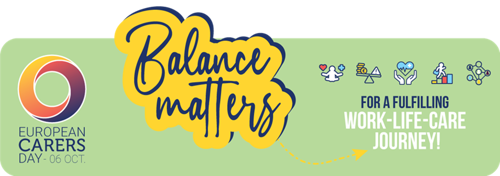Supporting Europe’s Informal Carers: a call to action for Pharma companies (Guest blog)

Informal carers across the EU play an invaluable role in the healthcare ecosystem. They provide essential physical, emotional and logistical support to their loved ones, enabling them to maintain a higher quality of life. However, the challenges faced by informal carers are immense as they often find themselves in need of support, both practical and psychological. This is where pharmaceutical companies can step in to make a significant difference.
Understanding the Situation of Informal Carers in Europe
Informal carers are individuals who provide unpaid care to family members or friends dealing with chronic illnesses, disabilities, or age-related conditions. In Europe, this group represents a substantial and growing demographic, accounting for over 12% of the total population. Their contributions to healthcare are immeasurable as they assist with daily activities, administer medications, and offer emotional support, and are only expected to grow as the number of older people in Europe is expanding.
Recent research reveals that as much as 80% of all care in Europe is provided by informal carers[1], with women providing the lion’s share as daughters (in law) and wives/partners. However, the role of an informal carer is physically and emotionally demanding. Carers indeed often experience stress, burnout, financial strain and a decrease in their own quality of life as they prioritise the needs of their care recipients. Balancing caregiving responsibilities with work and personal life can become overwhelming, negatively affecting their health and wellbeing.
The Role of Pharma Companies in supporting Informal Carers
Pharmaceutical companies, as central players in the healthcare industry, have a unique position to support informal carers in Europe. While their primary focus is on developing and providing medications and healthcare solutions, they can significantly enhance the wellbeing of informal carers.
Here are several ways in which pharma companies can make a positive impact:
- Education and Training: Informal carers often struggle to access basic information about their care recipients' conditions, available services and self-care strategies. Pharma companies can provide educational resources and training programs to equip carers with the knowledge and skills needed to provide effective care. These resources can include information about medications, disease management and coping strategies.
- Supportive Services: Emotional support is crucial for carers' wellbeing. Pharma companies can establish or support existing helplines, online platforms or apps that offer guidance and psychological assistance to informal carers, providing them with a sense of connection and access to valuable information.
- Patient Assistance Programme: Offering financial support or assistance programmes for individuals who struggle to afford medications can alleviate the financial pressure on both care recipients and informal carers.
- Advocacy and Awareness raising: Pharma companies can use their influence and resources to advocate for policies that support informal carers and raise awareness about their crucial role in the healthcare system. Championing the cause of carers can help create a more carer-friendly environment.
- Collaboration: Collaborating with carer organisations, patient advocacy groups and healthcare providers is crucial for creating comprehensive support networks for informal carers. These partnerships can lead to holistic solutions that address the needs of carers and care recipients.
- Innovation: Developing user-friendly medications and medical devices that are easier for informal carers to administer or assist with can significantly reduce their stress and workload.
- Inclusion in Research: Finally, informal carers should be actively involved in clinical trials and research studies to ensure that healthcare improvements address the practical needs and insights of those on the front lines of care.
The contribution of informal carers in Europe cannot be overstated. They form the backbone of our care systems, allowing their loved ones to receive the support they need while preserving their dignity and independence. However, their journey is marked by substantial challenges, often necessitating support.
Pharmaceutical companies, with their expertise, resources and commitment to improving healthcare, are uniquely positioned to make a significant impact on carers' lives. By offering assistance, education, resources and advocacy for carers, they can contribute to a more compassionate and sustainable healthcare ecosystem in Europe. Together, we can ensure that these dedicated individuals receive the recognition and assistance they truly deserve as they continue to care for their loved ones.
European Carers Day
The European Carers Day campaign takes place every year on the 6th October. The objective is to coordinate and foster national efforts aiming to raise awareness of carers’ issues under a pan-European structure. The campaign allows to capitalise on existing actions and enable/facilitate new initiatives among less-advanced parts of the continent. The fourth European Carers Day campaign will take place on the 6th October 2023, on the theme “Work, life and care - balance matters”.
For more information, please see https://eurocarers.org/ecd/.
[1] Van der Ende, M. et al., 2021, Study on exploring the incidence and costs of informal long-term care in the EU.

